- Home
- Lauren Tarshis
I Survived the Shark Attacks of 1916
I Survived the Shark Attacks of 1916 Read online
I SURVIVED
THE SHARK ATTACKS OF 1916
by Lauren Tarshis
illustrated by Scott Dawson
FOR LEO
Contents
Cover
Title Page
Dedication
Chapter One
Chapter Two
Chapter Three
Chapter Four
Chapter Five
Chapter Six
Chapter Seven
Chapter Eight
Chapter Nine
Chapter Ten
Chapter Eleven
Chapter Twelve
Chapter Thirteen
Chapter Fourteen
Chapter Fifteen
The Shark Attacks of 1916: An Unbelievable True Story
Facts About Shark Attacks
Teaser
I Survived the Sinking of the Titanic
About the Author
Copyright
CHAPTER 1
JULY 12, 1916
ELM HILLS, NEW JERSEY
IN THE MATAWAN CREEK
A feeling of terror came over ten-year-old Chet Roscow, a chill deep down in his bones. He had been swimming in the Matawan Creek by himself. But he had the idea that someone — or something — was watching him.
And then he saw it — a large gray fin, slicing through the water like a knife. What was that? Could it really be …
A shark?
That was impossible! Elm Hills was miles and miles from the ocean. How could a shark find its way into this little creek?
There was no way….
But now Chet could see it, coming toward him.
The gigantic shark, bigger than Chet himself. The black eyes staring up through the water.
Killer eyes.
Chet dove toward the shore, pounding through the water, kicking with all his might. His feet touched the bottom. He was running now, looking over his shoulder. The shark was right behind him, its huge jaws wide open, its white dagger teeth gleaming in its bloodred mouth.
CHAPTER 2
NINE DAYS EARLIER …
JULY 3, 1916 9:00
A.M.
THE ELM HILLS DINER
The Monday morning breakfast rush at the Elm Hills Diner was finally over.
Chet’s feet ached. He was covered in syrup, doughnut crumbs, and bacon grease. His curly red hair was damp with sweat. But he was surprisingly happy. Uncle Jerry was paying him a fortune to help out at his diner this summer — fifteen cents a day! Chet liked being surrounded by familiar faces and hearing folks calling out his name while he worked. Best of all, he was finally making some friends, his first since he came to live with Uncle Jerry last January. He was staying here for the year, while Mama and Papa were in California on business.
Chet was wiping down the counter when the front door banged open.
He smiled when he saw Dewey, Sid, and Monty rushing toward him. They came in every morning on their way to work at the tile factory. Chet had seen them at school — the loud boys who were always talking about baseball. But he hadn’t gotten to know them until this summer.
“Did you hear?” Dewey said, his freckly cheeks red with excitement.
“You won’t believe it!” said Monty, whose spectacles were fogged up from the humidity.
“Let me tell him!” said Sid, pushing his friends aside. He was the shortest of the three, and always in charge. “It was a shark!”
And then they all started talking at once.
“A shark attack!”
“It was huge!”
“Bit off a man’s leg!”
“There was blood everywhere!”
“The man is dead!”
“It happened right in Beach Haven!” said Monty.
Beach Haven was about seventy miles south of Elm Hills, right on the Atlantic Ocean. Chet had heard about the fine hotels there, and the people who swam in the ocean in their fancy bathing costumes. But he’d never heard of any shark attacks!
Uncle Jerry appeared from the kitchen, his bright blue eyes shining and his thick dark hair neatly combed back.
The guys always stood a little straighter when they saw Chet’s uncle. He’d been a baseball legend growing up here in Elm Hills. He could have gone pro, but he’d hurt his knee sliding home in a championship game. The team won, and Uncle Jerry could never play again. He still limped a little after a long day of work.
“What’s this about a shark?” he said as he passed out cinnamon doughnuts to each of the boys. “You fellas aren’t trying to fool us, are you?”
Chet knew the guys loved to pull pranks. On the last day of school, they’d put a frog in Minnie Marston’s lunch pail. She was the prettiest girl in school, but she’d been so mad her face turned an ugly shade of purple.
“We’re not foolin'!” Monty said, pulling a rumpled piece of newsprint from his trouser pocket. “Look at this!” he said.
He handed it to Chet. It was from the New Jersey Herald. The hair on the back of Chet’s neck stood up as he read the story. Uncle Jerry read it over his shoulder.
KILLER SHARK
ATTACKS SWIMMER!
JULY 2, 1916
BEACH HAVEN, NEW JERSEY
Charles Vansant, 25, was attacked by a large shark Saturday, July 1, while swimming in chest-deep water. He and his family were vacationing at the luxurious Engleside Hotel.
Mr. Vansant, known by all as a man of exceptional charm and great promise, was swimming with a dog when the attack occurred. The beach was filled with fashionable ladies and gentlemen enjoying the early evening breezes, when panicked shouts suddenly echoed through the air. A large black fin could be seen swimming toward Mr. Vansant. Onlookers screamed warnings. But it was too late. The shark brutally attacked the young man, who struggled to swim to shore. A lifeguard and two men rushed to his aid and finally managed to free him from the water.
But he died a short time later of his injuries. This is the first fatal shark attack on a human ever recorded on the northeastern shore of the United States.
Uncle Jerry laughed.
Chet stared at him. His uncle was tough. But did he really think a man getting ripped apart by a shark was funny?
“Boys, that article is a hoax,” Uncle Jerry said. “A shark will not attack a human. It’s a proven fact. Haven’t you ever heard of Mr. Hermann Oelrichs?”
None of them had.
“The guy was a millionaire,” Uncle Jerry said. “Owned a big shipping company. One day — let’s see, I think was about twenty-five years ago — this gent was out on his yacht with his rich friends, not far from New York City. They were out in the ocean, and they sailed right into a big school of sharks. The ladies screamed. But Oelrichs put on his bathing costume and dove into the water, practically right on top of those sharks.”
“Why did he do that?” Sid said.
“To prove that the sharks wouldn’t attack,” Uncle Jerry said. “He made a real commotion, splashing and kicking, even shouting at the sharks. And wouldn’t you know, the sharks swam away. They were scared as rabbits.”
Sid glanced at Chet and smiled.
“And that’s not all!” said Uncle Jerry. “Mr. Oelrichs offered a five-hundred-dollar reward to anyone who could come up with one case of a shark attacking a human on the northeastern coast of the United States.”
“Five hundred bucks!” said Dewey. “That’s crazy!”
“Maybe,” Uncle Jerry said. “But nobody ever collected. Because a shark simply will not attack a human. That cherry pie over there is more likely to attack you than a shark is.”
They all laughed.
But then a gravelly voice spoke up from the end of the counter.
“You got it wrong. Some sharks are killers.”
It was Captain Wilson, who came into the diner every day for breakfast. A long time ago he had been a whaling ship captain. But now he puttered around the creek in his broken-down motorboat. Usually he had a dazed look in his eyes, like he wasn’t sure where he was.
But now the Captain’s eyes were sharp.
“You’ve seen some sharks, Cap?” Uncle Jerry said, refilling the Captain’s coffee cup.
“Seen one?” the Captain said. “A white shark almost bit me right in two.”
“That so?” Uncle Jerry said, winking at Chet.
“I don’t want to scare you lads,” the Captain said.
“Please, sir!” Monty said. “Nothing scares us.”
“We can take it!” Sid insisted.
Chet realized with a happy jolt that the “we” included him.
Uncle Jerry went back into the kitchen, shaking his head.
“All right then,” the Captain said, looking around the empty diner. “But gather close. And don’t scream too loud. I don’t want to upset the other customers.”
CHAPTER 3
“The year was 1852,” the Captain began. “I wasn’t much older than you lads. It was one of my first whaling voyages. Two years at sea, and finally I was heading home across the Pacific.”
His voice was low and whispery, like it was coming from someplace very far away.
“Suddenly, the sky turned black. The wind started to howl, and rain poured down. I’ll never forget those waves. I thought our ship was going to be tossed to the moon. And the wind! It ripped our ship apart, like it was made of paper. We all went into the water. I grabbed a barrel and somehow I made it through the night. By the time the sun came up, the storm had passed. I was all alone. Just a tiny speck in the middle of the ocean.”
“The other men died?” Dewey asked.
But the Captain didn’t seem to hear.
“And then I saw the fin.”
“The shark?” whispered Monty, edging a little closer to Sid.
“Shhhh,” Sid said.
“It circled me for a long while,” the Captain said. “Around and around, real slow, like he was toying with me. Little by little, it came closer, and closer. Until I could see its eyes.
“Black as coal,” he whispered. “Killer eyes.”
The Captain was looking out the window now, like he expected to see that shark with its open jaws pressed against the glass.
“Killer eyes,” he repeated quietly.
It was a minute before he started talking again. The guys waited with their tongues practically hanging out.
“The beast went underwater, and for a second I thought maybe it’d decided I wasn’t worth the trouble. But then something bumped me in the leg. Scraped me bloody! The skin of a shark is rough. You can use it as sandpaper.”
The Captain rubbed his leg like it still hurt.
“It came in for the kill with its jaws wide open,” the Captain said. “Big enough to swallow me whole. And the teeth. Like daggers, a thousand daggers, all lined up in rows.”
The Captain’s hands were shaking now.
“I had an old harpoon tip in my pocket. I grabbed it. And I stabbed the shark.” He pounded the counter so hard that his coffee mug crashed to the floor. The Captain didn’t notice.
“Right in its killer eye,” he said.
“You killed it?” Dewey said.
The Captain shook his head. “Oh, no,” he said. “But it swam off. Disappeared. It wasn’t my time.”
Then he stood up and put on his tattered captain’s hat.
“I must get home now,” he said. “My sweet Deborah will be waiting for me.”
Deborah was his wife. She’d been dead for at least twenty years.
Chet and the guys watched him leave.
Uncle Jerry had come out of the kitchen when he heard the crash of the Captain’s cup.
“Poor old guy,” he said, as he swept up the mess. “His mind is like Swiss cheese.”
“You mean that story isn’t true?” Monty asked.
Uncle Jerry shrugged. “I think the Captain spins a mighty fine tale.”
“Stabbed it with a harpoon tip!” Dewey laughed.
“Killer eyes!” Monty barked.
“Next the Captain will be telling us he got gobbled up by a whale,” Sid said.
Still, Chet thought about the Captain all day. He didn’t really believe the story either. Uncle Jerry was right. Whoever heard of a shark attacking a person?
No, it wasn’t the shark that scared him. It was the idea of being alone in the middle of the ocean. Strange, but Chet could imagine that feeling. He’d been traveling around the country with Mama and Papa most of his life. Papa was always chasing some new business idea. Selling motorcars in Oregon. Building bicycles in St. Louis. Taking family portraits in Philadelphia. Mama would get them settled into an apartment or a run-down little house. Chet would try to make friends. And just when they were starting to get comfortable, the business would go bad or Papa would get some other idea. “We’re hitting the road,” Papa would announce. And Mama would have to start packing again.
Chet was supposed to go along to California, where Papa was sure he’d finally strike it rich. But then Mama decided that Chet would stay with Uncle Jerry instead.
“It’s a nice town,” Mama had said. “And Uncle Jerry will take good care of you.”
Chet remembered all the fun he used to have with Uncle Jerry when he was little, how Uncle Jerry had taught him how to throw a baseball. But they hadn’t seen each other in years. Would his uncle even recognize him after all this time?
He shouldn’t have worried. Uncle Jerry was standing on the train platform when Chet got off, a huge grin on his face. “It’s about time,” he said to Chet, wrapping him up in a hug that went on until after the train pulled out of the station. From that first day, Uncle Jerry made him feel right at home.
But Chet missed Mama and Papa. And it didn’t matter how much he loved being with Uncle Jerry, or how many people shouted “Hiya, Chet!” when they came into the diner. Soon enough he’d have to join Mama and Papa in California.
Would he ever really belong anywhere?
Or would he always be on his own, a tiny speck in the middle of the ocean?
CHAPTER 4
That next week was so hot, horses were fainting up and down Main Street. By Thursday, the temperature inside the diner was 102 degrees. But Chet didn’t mind the heat. Something amazing had happened that day: The guys had invited Chet to go swimming with them at the creek.
All week they’d been coming into the diner earlier and earlier, and then sticking around even after they’d wolfed down their doughnuts.
“You ever seen the Pacific Ocean?” Sid had asked one day.
“Sure,” Chet said.
“What’s it look like?” Monty asked.
Chet took a minute to picture it. He didn’t want to disappoint the guys.
“A little bluer than the Atlantic. Waves a little bigger maybe. But otherwise just lots of water and waves.”
They all seemed satisfied.
“How about the Mississippi River?” Dewey had asked the next day. “You seen that too?”
Chet told them it was wide and muddy.
“I was on a steamboat that got stuck in the mud,” Chet said. “We had to stay there for a whole day and night.”
That impressed them all.
“You’re the luckiest kid I know,” Sid pronounced.
“Me?” Chet said.
“Sure!” Monty said. “To see all those places!”
“I don’t know,” Chet said. “I hate moving around so much.”
Hearing those words startled Chet. He felt that way, but he’d never said it out loud. Not even to Uncle Jerry. He hoped the guys didn’t think he was bellyaching.
“Hey, why don’t you ever come down to the creek?” Sid said.
“We’re always looking for you there,” Monty said.
Chet
tried to hide his surprise.
“It’s not the Pacific Ocean,” Dewey said. “But it’s pretty nice.”
“I hear it’s better than the Pacific,” Chet said.
The guys all laughed.
“Why don’t you come today?” Sid said, and of course Chet said he would meet them after work.
Uncle Jerry drew Chet a little map so he wouldn’t get lost — a dotted line to the end of Main Street, and then behind the tile factory. Down a steep hill and across a path.
Chet made it to the bottom of the hill, and for a second he thought he was lost. He couldn’t see the creek, just tall golden grass. But then he could hear shouts and splashing. He walked through the grass and into a clearing. The guys’ dusty trousers and shirts were laid across some low branches. Three pairs of scuffed-up boots were tumbled across the dirt.
And just beyond, there was the creek.
The guys were right: It wasn’t much — maybe twenty feet across. He couldn’t tell if it was deep enough to dive. But it was nice and shady, and at that moment there was no place on earth that Chet would rather be.
“Hurry up!” Dewey shouted. “The water’s perfect.”
Chet threw his clothes off and climbed up onto the broken-down dock.
“Jump!” Sid said.
With a running leap, Chet launched himself into the air.
Whoosh! The cool water rose up around him. All of his worries washed away.
The guys gathered around him. Dewey threw a pink rubber ball high into the air.
“Chet! Catch!” he said.
Chet squinted up into the sun and, miraculously, caught the ball.
“Here!” Sid yelled, jumping up and waving his hands. Chet threw the ball, straight enough, like Uncle Jerry had taught him. Sid made a clean catch.
They played ball, then they took turns jumping off the dock and chasing each other back and forth across the creek.
When they got tired of swimming, they sat on the bank under a big elm tree. Dewey’s mother had packed him three big molasses cookies, and the guys fought over who could share with Chet.

 I Survived the Battle of D-Day, 1944 (I Survived #18)
I Survived the Battle of D-Day, 1944 (I Survived #18) I Survived the Great Molasses Flood, 1919
I Survived the Great Molasses Flood, 1919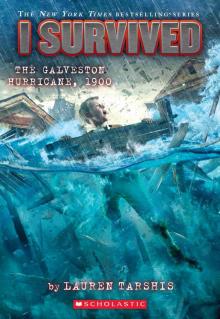 I Survived the Galveston Hurricane, 1900
I Survived the Galveston Hurricane, 1900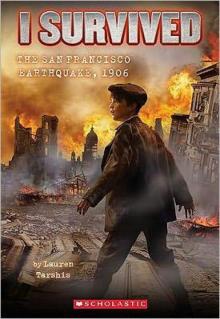 I Survived the San Francisco Earthquake, 1906
I Survived the San Francisco Earthquake, 1906 I Survived #4: I Survived the Bombing of Pearl Harbor, 1941
I Survived #4: I Survived the Bombing of Pearl Harbor, 1941 I Survived the Destruction of Pompeii, AD 79
I Survived the Destruction of Pompeii, AD 79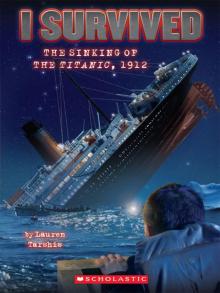 I Survived #1: I Survived the Sinking of the Titanic, 1912
I Survived #1: I Survived the Sinking of the Titanic, 1912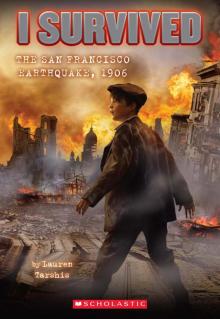 I Survived #5: I Survived the San Francisco Earthquake, 1906
I Survived #5: I Survived the San Francisco Earthquake, 1906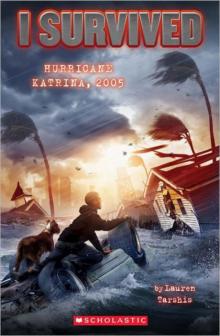 I Survived Hurricane Katrina, 2005
I Survived Hurricane Katrina, 2005 I Survived the Attacks of September 11th, 2001
I Survived the Attacks of September 11th, 2001 I Survived the Attack of the Grizzlies, 1967
I Survived the Attack of the Grizzlies, 1967 I Survived the Great Chicago Fire, 1871
I Survived the Great Chicago Fire, 1871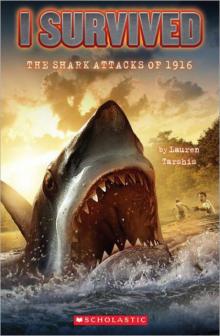 I Survived the Shark Attacks of 1916
I Survived the Shark Attacks of 1916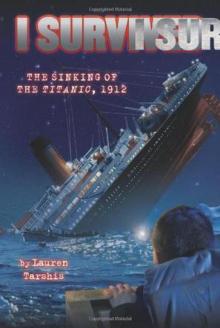 I Survived the Sinking of the Titanic, 1912
I Survived the Sinking of the Titanic, 1912 Emma-Jean Lazarus Fell Out of a Tree
Emma-Jean Lazarus Fell Out of a Tree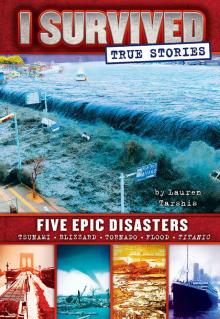 I Survived True Stories: Five Epic Disasters
I Survived True Stories: Five Epic Disasters I Survived the Hindenburg Disaster, 1937
I Survived the Hindenburg Disaster, 1937 I Survived the Children's Blizzard, 1888
I Survived the Children's Blizzard, 1888 I Survived the Joplin Tornado, 2011
I Survived the Joplin Tornado, 2011 I Survived the American Revolution, 1776
I Survived the American Revolution, 1776 Emma Jean Lazarus Fell in Love
Emma Jean Lazarus Fell in Love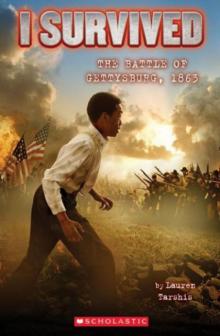 I Survived the Battle of Gettysburg, 1863
I Survived the Battle of Gettysburg, 1863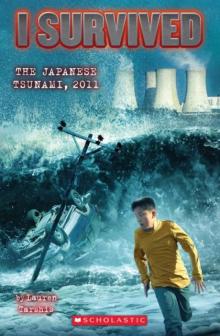 I Survived the Japanese Tsunami, 2011
I Survived the Japanese Tsunami, 2011